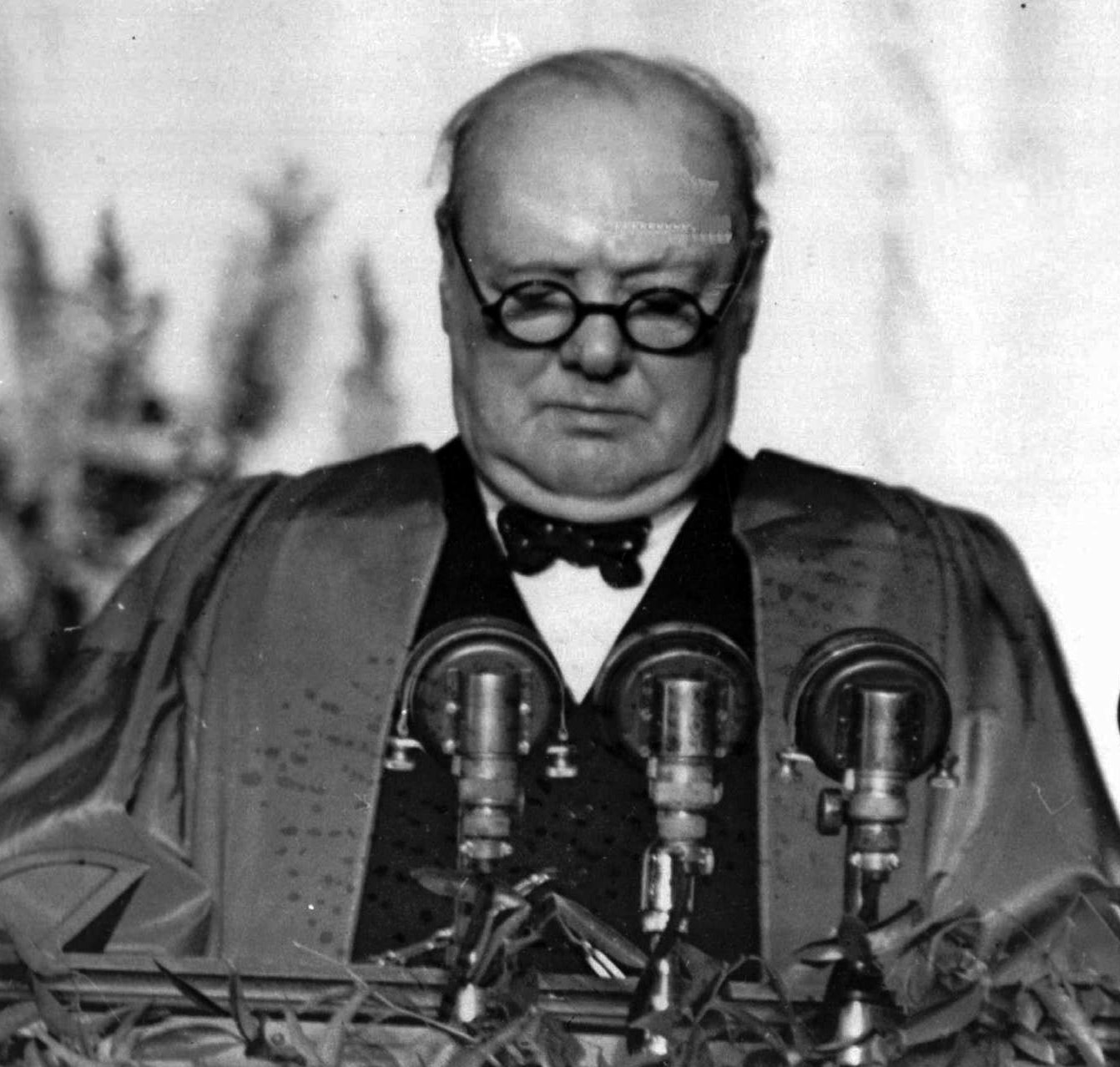For decades they have been the linchpins that kept businesses big and small running smoothly the world over, but is outsourcing and artificial intelligence about to end the quiet reign of the office secretary?
From M’s Miss Moneypenny in the James Bond films to Edith Nina “Jo” Sturdee, Sir Winston Churchill’s principal private secretary who typed up his famous Iron Curtain speech, secretaries have played an often silent but powerful role at the heart of business, politics and the civil service.
But their numbers are steadily declining. First executives — finally — learnt how to type their own correspondence. Now companies are increasingly looking to make cost savings by cutting in-house secretaries in favour of outsourcing administrative tasks to cheaper locations such as India and Africa, and turning to AI to take on diary management and travel bookings.

Sir Winston Churchill giving his Iron Curtain speech, which was typed by his secretary Edith Nina “Jo” Sturdee
AP:ASSOCIATED PRESS
Last week Grant Thornton, the accountancy and professional services firm, became the latest company to cut almost all of its UK-based secretaries shortly after its 250 partners each collected an average payout of £682,000, following the sale of a majority stake to the private equity firm Cinven this year.
A spokesman for Grant Thornton UK said: “Like all professional service firms, we continually evolve delivery models. Whilst a small number of people have left the firm, these decisions were made independent of our transaction with Cinven in response to the evolving needs of the business. This has always been part of how we work — and this moment is no exception.”
The rival accountancy firm Deloitte cut about 500 secretaries in 2021 while several leading law firms have also cut secretarial jobs, including Linklaters, Dechert and Reed Smith.
“This is not innovation. This is not digital transformation. This is short-term cost-cutting dressed up as progress,” Lucy Brazier, founder of Executive Support Magazine, said. “It is exactly what happens when leadership fails to understand the true value of the administrative function.”
Brazier, who was awarded an OBE for services to office professionals in 2021, said she had previously worked with Grant Thorton on the structure and training of its assistants. “The impact [they had] was clear,” she said. “Assistants were giving partners back around a quarter of their time. Now take the collective salaries of those partners and multiply them by 25 per cent. Tell me again this move is saving money. And that’s before you count the additional revenue generated with the time assistants freed up.”
Brazier said company leaders “completely misunderstand” what secretaries actually do. “A proactive assistant doesn’t just give back time — they anticipate risk, guard relationships, provide continuity and create bandwidth for leaders to lead. You don’t get that from a low-cost offshore model. And you certainly don’t get it from AI.”
She called on secretaries and executive assistants across the country to “prove, every single day, that you are infrastructure, not overhead. The future of administration is being decided in rooms you are not in — unless you fight to be heard.”
Carl Benedikt Frey, professor of AI & Work at the Oxford University’s Internet Institute, said the role of the secretary had always evolved with technology and this was the latest adaptation.
“Back in the day there were banks and banks of typists,” he said. “Then with the introduction of computers they became more office managers and organisers. But now you can ask AI to manage calendars and find flights, and it makes sense to do so.”
• Business live: the latest on companies, markets and economics
Frey said the number of secretaries in the workplace was naturally decreasing as “people can do more of these tasks for themselves”. However, he did not expect the number of secretaries to drop to zero. “We will still need people physically in the office to manage people and to help co-ordinate the AI to make sure people are using it efficiently.”
The secretaries of tomorrow will be doing “much more high-level skilled work”, he added. “The job has undergone an extraordinary evolution. If you read the job description of today and compare it to a decade ago, it’s unrecognisable. And AI will supercharge that.”
Randall Peterson, director of the Leadership Institute at London Business School, said executives’ reliance on secretaries has been waning since the 1990s as bosses became more tech-literate.
“It really picked up pace during the pandemic,” he said. “As businesses couldn’t have secretaries ‘in the room’ they learnt that they don’t need them in the room. Roles got outsourced to cheaper countries and now AI is capable of doing many of the traditional secretarial functions.”
However, for companies there was the risk of a false economy. “If managers have to spend more of their time accessing the new systems, it could end up costing the company more in lost executive time.”

Personal assistants may have to take on new skillsets
ALAMY
Victoria Rabin, founder and chief executive of the Executive Assistants Organisation (EAO), which trains future assistants, said managers were increasingly being told to “replace your EA with AI” — but there’s nothing that can replace that relationship between an executive and their assistant.
“Over the years EAs have become game-changers in enforcing the efficiency and productivity of today’s executives. They are the most important asset an executive can have. They provide their leaders the tools required to be 100 per cent focused on the bigger picture.”
Rabin said the skillset executive assistants require is rapidly evolving and they now fulfil more of a problem-solver role than simply administration.
“There is a focus on communication skills, time management, project management, technology and AI, stress management and conflict management and leadership training,” she said. “There are some skills that cannot be taught that the role requires: being inherently nurturing, meticulous, empathetic, thick-skinned and extremely resourceful. It takes a certain breed of individual to be an executive assistant.”
Rabin, who was born in Chelmsford, Essex, but now lives and works in San Diego, California, said the term secretary was not used in the US as “they are more than that — they really run the lives of their executives. They are partners. They know them as intuitively as their wives or husbands do.”
